Andy Ray’s Ten Best Films of the Decade
What a decade! The twenty-teens produced so many great films, I think had more difficulty selecting only the ten best than in any other decade. Consider that I had to leave “Whiplash,” “Brooklyn,” “Spotlight,” and “Three Billboards Outside Ebbing, Missouri” off my list, and it becomes obvious what a stacked ten-year period of creative and innovative filmmaking it was. Here is my list of the best pictures of the preceding decade:
Wolf of Wall Street
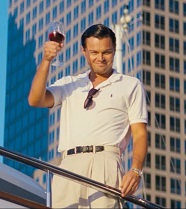 2013 joined 1939 and 1975 as one of the greatest years of motion pictures in history. Four films from that year adorn my list, and if I were to expand my list to 20 films, I would add two more from 2013. It was one of those rare years of prolific filmmaking, and it included #10 on my list – Martin Scorsese’s “Wolf of Wall Street,” the true story of the rise and fall of Wall Street stockbroker Jordan Belfort, played to the hilt by Leonardo DiCaprio, in the best performance of his career. Jonah Hill is also strong as Belfort’s right-hand man, and director Rob Reiner turns in an uproarious cameo as Belfort’s excitable father. “Wolf of Wall Street” is three hours of over-the-top self-indulgence in the laugh-out-loud funniest picture of the decade. It also features more F-bombs than in any other picture I think I’ve ever seen.
2013 joined 1939 and 1975 as one of the greatest years of motion pictures in history. Four films from that year adorn my list, and if I were to expand my list to 20 films, I would add two more from 2013. It was one of those rare years of prolific filmmaking, and it included #10 on my list – Martin Scorsese’s “Wolf of Wall Street,” the true story of the rise and fall of Wall Street stockbroker Jordan Belfort, played to the hilt by Leonardo DiCaprio, in the best performance of his career. Jonah Hill is also strong as Belfort’s right-hand man, and director Rob Reiner turns in an uproarious cameo as Belfort’s excitable father. “Wolf of Wall Street” is three hours of over-the-top self-indulgence in the laugh-out-loud funniest picture of the decade. It also features more F-bombs than in any other picture I think I’ve ever seen.
The Florida Project
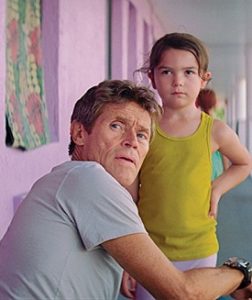 Young newcomer Brooklynn Kimberly Prince radiated childhood confidence in the best film of 2017, Sean Baker’s “The Florida Project” – an exploration of the lives of those who live in rundown motels, and try to find work wherever they can even though they possess no marketable skills. But “The Florida Project” is no downer. This is an exciting and fun romp through the daily lives of a small group of kids determined to find adventure in everything they do. Willem Dafoe has never been better as the motel manager and all-around handyman, who feels a sense of protection over his lodgers while intent on keeping mischief at bay. There’s never been another film quite like “The Florida Project,” and its pure uniqueness plays into its overarching theme of social criticism. The irony of the motel’s proximity to Disney World is never lost on viewers, and the film’s final shot is mesmerizing.
Young newcomer Brooklynn Kimberly Prince radiated childhood confidence in the best film of 2017, Sean Baker’s “The Florida Project” – an exploration of the lives of those who live in rundown motels, and try to find work wherever they can even though they possess no marketable skills. But “The Florida Project” is no downer. This is an exciting and fun romp through the daily lives of a small group of kids determined to find adventure in everything they do. Willem Dafoe has never been better as the motel manager and all-around handyman, who feels a sense of protection over his lodgers while intent on keeping mischief at bay. There’s never been another film quite like “The Florida Project,” and its pure uniqueness plays into its overarching theme of social criticism. The irony of the motel’s proximity to Disney World is never lost on viewers, and the film’s final shot is mesmerizing.
Nebraska
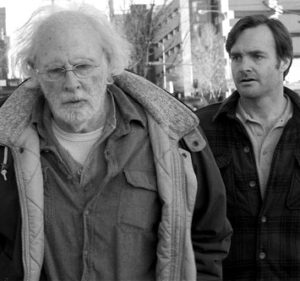 Back to 2013 for Alexander Payne’s black-and-white comedy-drama “Nebraska,” the film which gave 77-year-old Bruce Dern the best role of his career. Telling the fictitious tale of a Montana man who embarks on a trek to Nebraska, convinced he’s won a sweepstakes drawing, this is another of the funniest films of the decade. Will Forte plays his son, and June Squibb his tart-tongued wife in a film which also works as a tender story about a societal outcast and his attempt to reconnect with his extended family. It’s touching, very moving, and the crotchety Dern is at the top of his game.
Back to 2013 for Alexander Payne’s black-and-white comedy-drama “Nebraska,” the film which gave 77-year-old Bruce Dern the best role of his career. Telling the fictitious tale of a Montana man who embarks on a trek to Nebraska, convinced he’s won a sweepstakes drawing, this is another of the funniest films of the decade. Will Forte plays his son, and June Squibb his tart-tongued wife in a film which also works as a tender story about a societal outcast and his attempt to reconnect with his extended family. It’s touching, very moving, and the crotchety Dern is at the top of his game.
Room
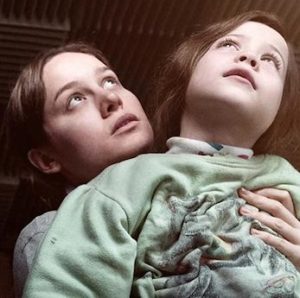 As far as child acting is concerned, eight-year-old Jacob Tremblay’s performance in Lenny Abrahamson’s 2015 drama “Room” was as strong as that of Anna Paquin in “The Piano” or even Tatum O’Neal in “Paper Moon.” He carried this story of a mother (Oscar-winner Brie Larson) and her son trapped in a shed by a criminal who confines them so he can have occasional sex with the mother. Told from the point of view of the boy, “Room” really catches fire after the two escape, and try to adjust to the outside world. Completely unique, Emma Donoghue’s adapted screenplay forces us to view their predicament through the lens of the boy, rather than through the more hardened viewpoint of his mother. This “softens the blow” of their situation, while also allowing us to marvel at the mother’s presentation of their situation to her son.
As far as child acting is concerned, eight-year-old Jacob Tremblay’s performance in Lenny Abrahamson’s 2015 drama “Room” was as strong as that of Anna Paquin in “The Piano” or even Tatum O’Neal in “Paper Moon.” He carried this story of a mother (Oscar-winner Brie Larson) and her son trapped in a shed by a criminal who confines them so he can have occasional sex with the mother. Told from the point of view of the boy, “Room” really catches fire after the two escape, and try to adjust to the outside world. Completely unique, Emma Donoghue’s adapted screenplay forces us to view their predicament through the lens of the boy, rather than through the more hardened viewpoint of his mother. This “softens the blow” of their situation, while also allowing us to marvel at the mother’s presentation of their situation to her son.
The Descendants
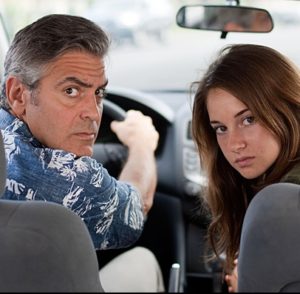 Alexander Payne is the only director to appear on my list twice. Not only did he direct “Nebraska,” but in 2011 he churned out the comedy-drama “The Descendants,” which stars George Clooney as a father of two girls, who happens to be grappling with selling a large chunk of family land to developers (much to consternation of several extended family members), when his wife enters a coma following a boating accident. Forced to assume all parental duties at a pivotal moment in his business life, Clooney turns in an all-around great performance, but the real find of “The Descendants” was 19-year-old Shailene Woodley, in her motion picture debut. She plays Clooney’s elder daughter, who has a history of substance abuse, and is away at a boarding school. There’s a lot going on in “The Descendants,” and the screenplay presents the story lines from all angles.
Alexander Payne is the only director to appear on my list twice. Not only did he direct “Nebraska,” but in 2011 he churned out the comedy-drama “The Descendants,” which stars George Clooney as a father of two girls, who happens to be grappling with selling a large chunk of family land to developers (much to consternation of several extended family members), when his wife enters a coma following a boating accident. Forced to assume all parental duties at a pivotal moment in his business life, Clooney turns in an all-around great performance, but the real find of “The Descendants” was 19-year-old Shailene Woodley, in her motion picture debut. She plays Clooney’s elder daughter, who has a history of substance abuse, and is away at a boarding school. There’s a lot going on in “The Descendants,” and the screenplay presents the story lines from all angles.
Hell or High Water
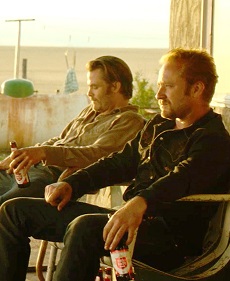 2016’s “Hell or High Water” told the story of two brothers who rob a series of banks in West Texas to save their family farm from foreclosure. Set against the backdrop of the oil glut of the 2000s, director David Mackenzie’s Texas landscape is practically a character in and of itself in this modern-day western. Chris Pine and Ben Foster play the young brothers, while Gil Birmingham and Jeff Bridges (in one of the best acting achievements of his long career) are the marshals tasked with bringing them to justice. Combining the quirky characters of the Coen Brothers, the harshness of Sam Peckinpah, and the glossy set-pieces of Quentin Tarantino, this film transports us to a post-oil-boom West Texas landscape in which the bad guys are as smart as the rangers assigned to bring them to justice. It’s an absolute joy watching each carefully-crafted scene play out. The Taylor Sheridan screenplay is a brilliant melding of old-school western with present-day sensibility. And for some serious subject matter, it’s another of the funniest films of the teens. I loved everything about “Hell or High Water.”
2016’s “Hell or High Water” told the story of two brothers who rob a series of banks in West Texas to save their family farm from foreclosure. Set against the backdrop of the oil glut of the 2000s, director David Mackenzie’s Texas landscape is practically a character in and of itself in this modern-day western. Chris Pine and Ben Foster play the young brothers, while Gil Birmingham and Jeff Bridges (in one of the best acting achievements of his long career) are the marshals tasked with bringing them to justice. Combining the quirky characters of the Coen Brothers, the harshness of Sam Peckinpah, and the glossy set-pieces of Quentin Tarantino, this film transports us to a post-oil-boom West Texas landscape in which the bad guys are as smart as the rangers assigned to bring them to justice. It’s an absolute joy watching each carefully-crafted scene play out. The Taylor Sheridan screenplay is a brilliant melding of old-school western with present-day sensibility. And for some serious subject matter, it’s another of the funniest films of the teens. I loved everything about “Hell or High Water.”
American Hustle
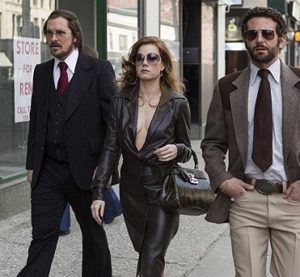 In the most flat-out entertaining film of the decade, David O. Russell’s 2013 black comedy “American Hustle” told the fictional story of two con artists (Christian Bale and Amy Adams) who run afoul of an FBI agent (Bradley Cooper), and become involved in a local New Jersey government corruption scheme which eventually leads to the Abscam scandal of the 1970s. If she hadn’t done so before, Amy Adams solidified herself as the greatest actress of her generation in a brilliant performance in which she spends half her time “disguised” as a British aristocrat to lure victims into a loan scam. A year after her Oscar-winning turn in “Silver Linings Playbook,” Jennifer Lawrence was even better as Bale’s erratic wife – just smart enough to be a part of the scam, but dumb enough to spill the beans at inopportune moments. Her house-cleaning scene ranks as one of the decade’s most humorous. Russell directs “American Hustle” in pure Martin Scorsese form – even beginning the screenplay in the middle of the story. And the result is a film every bit as good as Scorsese classics “GoodFellas” and “Casino.” And that’s saying something.
In the most flat-out entertaining film of the decade, David O. Russell’s 2013 black comedy “American Hustle” told the fictional story of two con artists (Christian Bale and Amy Adams) who run afoul of an FBI agent (Bradley Cooper), and become involved in a local New Jersey government corruption scheme which eventually leads to the Abscam scandal of the 1970s. If she hadn’t done so before, Amy Adams solidified herself as the greatest actress of her generation in a brilliant performance in which she spends half her time “disguised” as a British aristocrat to lure victims into a loan scam. A year after her Oscar-winning turn in “Silver Linings Playbook,” Jennifer Lawrence was even better as Bale’s erratic wife – just smart enough to be a part of the scam, but dumb enough to spill the beans at inopportune moments. Her house-cleaning scene ranks as one of the decade’s most humorous. Russell directs “American Hustle” in pure Martin Scorsese form – even beginning the screenplay in the middle of the story. And the result is a film every bit as good as Scorsese classics “GoodFellas” and “Casino.” And that’s saying something.
12 Years a Slave
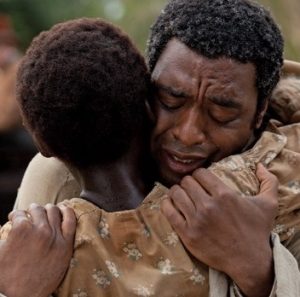 Much as with Steven Spielberg’s “Schindler’s List,” I’m glad I saw Steve McQueen’s “12 Years a Slave.” But I don’t ever need to see it again. McQueen’s 2013 masterpiece does for the institution of American slavery what “Schindler’s List” did for the Holocaust – exposing its sheer brutality and dehumanizing sensibility for all it’s worth. Chiwetel Ejiofor stars as Solomon Northrup, a free black man living in New York, and sold into slavery during the pre-Civil War South. Featuring an Oscar-winning supporting performance by Lupita Nyong’o as a female slave working the same plantation as Northrup, “12 Years a Slave” is sometimes difficult to watch – not so much for the physical violence, but for the psychological barbarism against those tasked with working the fields. In the film’s most harrowing scene, a slave is hung from a tree and left hanging there the remainder of the day, as passing slaves walk by and pretend not to notice, lest they face dire consequences.
Much as with Steven Spielberg’s “Schindler’s List,” I’m glad I saw Steve McQueen’s “12 Years a Slave.” But I don’t ever need to see it again. McQueen’s 2013 masterpiece does for the institution of American slavery what “Schindler’s List” did for the Holocaust – exposing its sheer brutality and dehumanizing sensibility for all it’s worth. Chiwetel Ejiofor stars as Solomon Northrup, a free black man living in New York, and sold into slavery during the pre-Civil War South. Featuring an Oscar-winning supporting performance by Lupita Nyong’o as a female slave working the same plantation as Northrup, “12 Years a Slave” is sometimes difficult to watch – not so much for the physical violence, but for the psychological barbarism against those tasked with working the fields. In the film’s most harrowing scene, a slave is hung from a tree and left hanging there the remainder of the day, as passing slaves walk by and pretend not to notice, lest they face dire consequences.
The Master
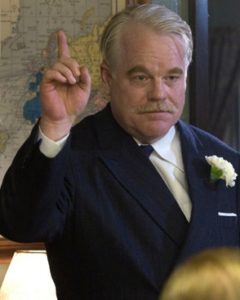 For the third decade in a row, my pick for second-best picture of the decade is directed by Paul Thomas Anderson. Following 1999’s “Magnolia” and 2007’s “There Will Be Blood,” 2012’s “The Master” told the tale of a young hot-tempered World War II veteran and drifter (Joaquin Phoenix, in a mesmerizing performance) who becomes a disciple of religious leader Lancaster Dodd, played by the great Philip Seymour Hoffman, in one of his last major roles. Loosely based on L. Ron Hubbard, founder of the Church of Scientology, Dodd uses his overbearing charm to lure directionless souls into his cult. Dodd conducts and records uncomfortable rapid-fire interviews of his subjects (including Phoenix’s character), in the name of research for his soon-to-be-published book. In another great performance, Amy Adams plays Dodd’s wife – the smartest person in the entire film, and the driving force “behind the scene” of Hoffman’s bombastic and over-confident Dodd. As with all Anderson films, he lets his actors act. Phoenix’s jail scene of self-destruction is as powerful as that of Robert De Niro in “Raging Bull.” And Hoffman’s “I’ll Go No More A-Roving” scene is one that will stick with you forever. “The Master” is not for everyone’s taste. But it further cements Anderson’s place as our greatest active director.
For the third decade in a row, my pick for second-best picture of the decade is directed by Paul Thomas Anderson. Following 1999’s “Magnolia” and 2007’s “There Will Be Blood,” 2012’s “The Master” told the tale of a young hot-tempered World War II veteran and drifter (Joaquin Phoenix, in a mesmerizing performance) who becomes a disciple of religious leader Lancaster Dodd, played by the great Philip Seymour Hoffman, in one of his last major roles. Loosely based on L. Ron Hubbard, founder of the Church of Scientology, Dodd uses his overbearing charm to lure directionless souls into his cult. Dodd conducts and records uncomfortable rapid-fire interviews of his subjects (including Phoenix’s character), in the name of research for his soon-to-be-published book. In another great performance, Amy Adams plays Dodd’s wife – the smartest person in the entire film, and the driving force “behind the scene” of Hoffman’s bombastic and over-confident Dodd. As with all Anderson films, he lets his actors act. Phoenix’s jail scene of self-destruction is as powerful as that of Robert De Niro in “Raging Bull.” And Hoffman’s “I’ll Go No More A-Roving” scene is one that will stick with you forever. “The Master” is not for everyone’s taste. But it further cements Anderson’s place as our greatest active director.
Boyhood
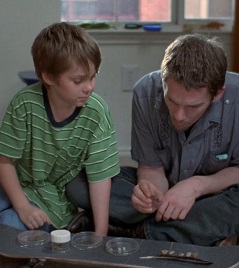 Forget the “gimmick” of Richard Linklater’s 2014 coming-of-age drama “Boyhood.” This was the movie filmed on-and-off over a 12-year period using the same actors as they grew and aged. While unique, this technique is not what makes “Boyhood” the best film so far this millennium. No, “Boyhood” succeeds by giving us four of the most intriguing characters ever presented on the big screen – and tracing their family history through the entire youth of the children – from elementary school through college. Patricia Arquette’s and Ethan Hawke’s characters are already divorced at the outset, and Linklater’s original screenplay follows Arquette’s character through two more ill-advised marriages. Although Arquette won an Oscar for her performance, it’s Hawke who really shines here as the father. At first, we believe he’ll be the absent father who wins over his kids with presents and fun times when he visits. But as the years advance, he becomes the more responsible parent in a story which manages to click off the milestones of youth (losing virginity, experimenting with marijuana) while always staying one step ahead of us. Clocking in at nearly three hours, I was so captivated by the characters I could have spent the next three hours watching the rest of their lives. “Boyhood” is that rare masterpiece that comes along about once a generation. While the twenty-teens provided us many great films, “Boyhood” is in a league of its own.
Forget the “gimmick” of Richard Linklater’s 2014 coming-of-age drama “Boyhood.” This was the movie filmed on-and-off over a 12-year period using the same actors as they grew and aged. While unique, this technique is not what makes “Boyhood” the best film so far this millennium. No, “Boyhood” succeeds by giving us four of the most intriguing characters ever presented on the big screen – and tracing their family history through the entire youth of the children – from elementary school through college. Patricia Arquette’s and Ethan Hawke’s characters are already divorced at the outset, and Linklater’s original screenplay follows Arquette’s character through two more ill-advised marriages. Although Arquette won an Oscar for her performance, it’s Hawke who really shines here as the father. At first, we believe he’ll be the absent father who wins over his kids with presents and fun times when he visits. But as the years advance, he becomes the more responsible parent in a story which manages to click off the milestones of youth (losing virginity, experimenting with marijuana) while always staying one step ahead of us. Clocking in at nearly three hours, I was so captivated by the characters I could have spent the next three hours watching the rest of their lives. “Boyhood” is that rare masterpiece that comes along about once a generation. While the twenty-teens provided us many great films, “Boyhood” is in a league of its own.
Andy Ray‘s reviews also appear on http://youarecurrent.com/category/nightandday/film-reviews/
and he serves as the radio film critic for https://lifestyleindy.com/radio/